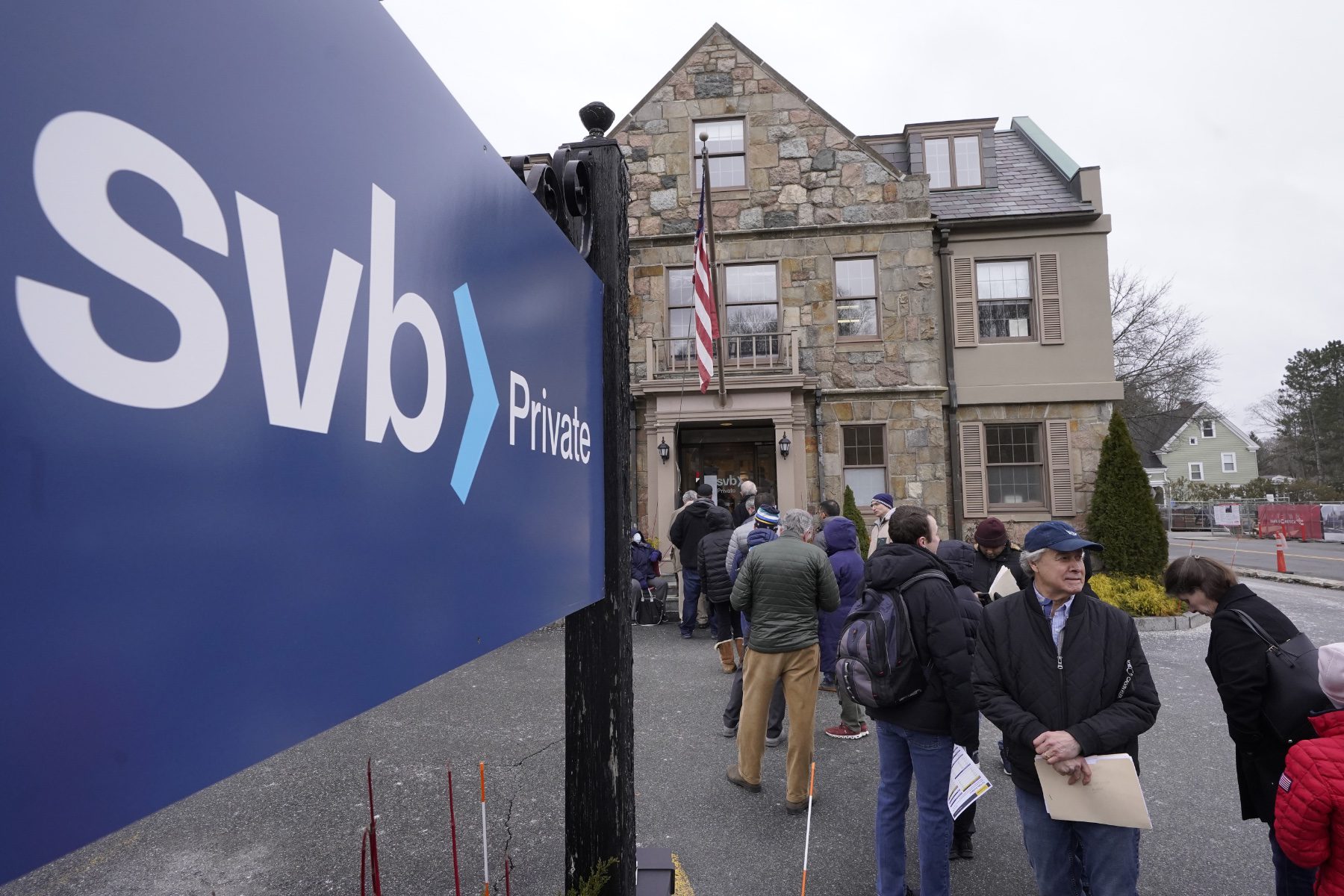Your trusted source for contextualizing business & economy news. Subscribe to our daily newsletter.
Silicon Valley Bank was the only one that would give Liz Giorgi a line of credit. It was 2019, and Giorgi was launching a new business venture called soona, a virtual photography studio service. Twenty-seven other banks had turned her away. Giorgi remembers sitting down with bankers who asked clearly inappropriate questions: What does your husband do for a living? How much money does he make?
But Silicon Valley Bank (SVB) offered a solution. Being a resource for women founders was one of SVB’s stated goals. It helped women-owned, venture-backed tech businesses like hers in a climate where businesses owned by people of color, women and LGBTQ+ people face significant barriers to accessing credit. That was true even for founders like Giorgi, who had already previously built a successful video production business that counted Facebook as a client.
“People think of this underbanked problem as these banks need to market to more women,” Giorgi said. “No no no, this is a cultural problem that happens at an individual level … and that creates these ripple effects across the entirety of the entrepreneurial ecosystem where the end result is women are underbanked.”
Access to Innovation, one of SVB’s programs, was centered around connecting women-, Black- and Latinx-owned businesses with start-up funding. Another, the SVB Fellows Program, connected entrepreneurs from those same groups with venture capital firms.
The bank was focused on diversity within its workforce, too. For five years in a row, it had been recognized by the Bloomberg Gender-Equality Index for its performance in transparent gender data reporting and equity in the workplace. About 46 percent of its workforce and 38 percent of its senior leadership was women. Those diversity, equity and inclusion initiatives have drawn criticism from conservative lawmakers who say the bank was too focused on “woke” policies and that caused it to make mistakes, but so far there has been no evidence that those initiatives were connected to what would happen next.
The bank knew that “women entrepreneurs are a massive market opportunity and they were very bullish on trying to engage with our community in various ways,” said Karen Cahn, the CEO of iFundWomen, a funding marketplace for women-led start-ups and small businesses.
But last week, SVB’s appetite for risk and a serious miscalculation of the changing economic climate led to its demise. SVB failed to act quickly when a confluence of rising interest rates and diminished funding in start-ups, the bulk of SVB’s business, led founders to start pulling cash from their accounts. To help mitigate that, SVB sold a portfolio of Treasury bonds at a nearly $2 billion loss — and when news got out, panic ensued.
The vast majority of the accounts with SVB held more than $250,000, the most that the Federal Deposit Insurance Corporation (FDIC) will insure in case of a bank failure. About 90 percent of the bank’s $175 billion in deposits were uninsured, according to FDIC filings, an unusually high proportion. Fearing the bank’s collapse after the Treasury bonds were sold, depositors withdrew their money before they lost it. That sent the bank into free fall, and the federal government stepped in. On Monday, President Joe Biden announced that depositors will be made whole, whether or not all of their money was insured.
That was a relief to small-business owners who were worried they’d lose their money and their businesses, but the question now is what comes next? Where will they go if SVB was one of the few banks that would have them? Giorgi said she’s heard from seven other women founders who are wondering, like her, where to look.
“One of the reasons that there are threads and text threads and Slack threads and female founders talking about this is because you want to be able to say, ‘OK, I got this sort of offer from this bank, what did you get?’” said Giorgi, whose relationship with SVB helped turn her business into a 145-people operation with $54 million in venture capital funding in just three years.
Underrepresented founders “are mostly asking to be treated the same,” she said. “And these situations are more painful simply because we aren’t.”
A new Federal Reserve survey released this month found that small businesses report significant challenges getting fully approved for the loans they’re seeking from banks. The percentage of small businesses that received full funding dropped 36 percent in 2022 when compared with 2019, and the largest drop was for Black-owned businesses (41 percent). Asian-owned small businesses saw a 28 percent drop in approvals, and Latinx-owned businesses experienced a 17 percent decrease. The survey also found that 74 percent of women-owned firms had to rely on the owner’s personal savings or funds from family and friends in the past five years, compared with 64 of businesses owned by men.
LGBTQ+-owned businesses report similar challenges: Nearly half of LGBTQ+ owners received none of the funding they applied for in the past year, according to an analysis of a 2021 Federal Reserve survey by the Center of LGBTQ Economic Advancement & Research. Thirty-three percent of respondents said lenders didn’t approve financing for “businesses like theirs”. The figure was 24 percent for non-LGBTQ+-owned businesses.
But it’s those same groups that have been driving business creation. In 2021, 49 percent of new businesses were run by women, compared with 28 percent in 2019, according to a recent study by Gusto, a software company that provides payroll and HR management for businesses. The share of new businesses run by Black owners tripled to 9 percent in that timeframe, and the share of Latinx owners rose from 8 percent to 10 percent.
And yet, in 2022, women business owners got just 2.1 percent of capital investments in venture-backed startups, according to PitchBook, a venture capital, private equity, and merger and acquisition database. About 0.3 percent goes to women of color, iFundWomen found. And LGBTQ+ founders get less than 1 percent of venture capital funding, according to StartOut, a nonprofit that collects data on LGBTQ+ entrepreneurs.
Even at a bank like SVB, which worked primarily with venture-capital-backed firms, many women, people of color and LGBTQ+ people were shut out. Now, the bank’s failure will affect all minority groups that already struggle to get venture capital funding, Cahn said, because those purse strings are probably going to get tighter.
“The funding opportunities in venture capital for women that were virtually nonexistent before are literally nonexistent now,” Cahn said.
Vanessa Pham, the CEO and co-founder of Asian cooking sauce company Omsom, said that’s one of her concerns in the days ahead.
“In any contraction everything gets harder for small business and emerging brands,” said Pham, who runs the business with her sister, Kim. They’re daughters of Vietnamese refugees. In a collapse like SVB’s, “I know that will impact us in many ways, both in terms of consumer spending and meaningfully on operations and financial access.”
When news broke of SVB’s failure, Pham said her first worry was that they would fall into an ecosystem where it would be up to investors and creditors “to decide who gets to live.” Omsom had all of its capital in an SVB account.
Businesses owned by people of color and women are viewed as riskier from the onset, in large part because of historic inequality that forces those businesses to start from a place of lower capital and less access. For women, it’s in part because they are paid less than men — the gender pay gap hasn’t budged in 20 years — and so they are more likely to have less money saved, to have fewer assets like a home. Those challenges are compounded for people of color, and women of color especially, for whom the pay gap is wider, homeownership rates are lower, and banking relationships are less established.
Still, Pham has had more access than many women of color, she said. She studied at Harvard and worked as a management consultant at Bain & Company. She went to SVB because she knew they worked well with other venture-capital-backed start-up businesses.
For her, getting through the collapse of the bank happened through community. The Pham sisters posted an open letter to SVB on Instagram that went viral.
“This poses a major existential threat to many small businesses (especially those creating physical goods),” the sisters wrote on Saturday. “When large institutions and gatekeepers make big changes, it is oftentimes the smallest and most marginalized groups who feel the impact the heaviest.”
In response, investors, vendors and customers showered them with support, including by buying their products. A friend helped Omsom establish a line of credit with JPMorgan Chase. Pham’s now working on establishing more banking relationships.
“I would say there is a lot of grassroots community building going on where we are supporting each other in very tangible ways,” Pham said.
There are logistical challenges in finding new banking partners, and particularly ones who understand how to assess risk for tech start-ups, said Randell Leach, CEO of Beneficial State Bank. When there’s a clear asset the bank can repossess if something goes wrong — like a refrigerator at a bakery — that’s an easier calculation to make than if the asset is software, like in the case of Giorgi’s business. Tech founders want to form a relationship with a bank like SVB that understands the industry and provides additional support for commercial banking, like multi-currency accounts and wires, as well as broader support connecting businesses with investors.
The pool of options, then, is quite small.
Community Development Financial Institutions like Leach’s — which include credit unions, mission-driven banks or loan funds that specifically work with underserved communities — offer one solution for new partners, albeit a limited one. They may not “have the balance sheet for larger loans, they may not have this rapid approval for a credit score model,” he said, but they do have the values proposition. Angel investors that specialize in funding minority-run start-ups are another potential solution.
Moving forward, banks may also put higher standards in place for issuing credit, loans and providing funding, which will also affect businesses owned by women, people of color and LGBTQ+ people, said Lyda Bigelow, a professor of strategy and entrepreneurship at the University of Utah.
“Part of the problem is that, especially when you’re talking about start-ups, perhaps your current return measure, or current increase in sales year-over-year, or current expected growth over the next 12 months — maybe those metrics don’t look as good as a comparable start-up run by a White dude,” Bigelow said. “That’s always difficult for the smallest and riskiest start-ups and that generally correlates with the founders’ demographics.”
Danny Taing, the founder of Bokksu, a Japanese snack box subscription service, said he’s been in a sense mourning the loss of the community that SVB created for minority founders. Not only did the bank connect him with his lead investors, but it also helped fund Asian-American events and was planning to feature him more broadly in the community in the coming months as both an Asian-American founder and an out gay man.
“It’s going to be a huge loss for our community because plenty of straight White male founders have support networks, but there’s pretty much no money for us. … Now I have to build new relationships again from the ground up with bigger banks, and honestly I don’t think they are going to care about me,” Taing said. “It’s this loss of a really big champion.”
He and other founders are working to raise awareness to the challenges for minority-owned businesses and to help each other with funding if things get difficult again.
“We have to help each other,” Taing said, “because not a lot of people helped us.”







